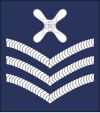| This article needs additional citations for verification. Please help improve this article by adding citations to reliable sources. Unsourced material may be challenged and removed. Find sources: "Chief technician" – news · newspapers · books · scholar · JSTOR (May 2024) (Learn how and when to remove this message) |


Chief technician (Chf Tech or formerly C/T) is a senior non-commissioned rank in the Royal Air Force which is only held by aviators in technical trades and by musicians. It is between sergeant and flight sergeant and, like the latter has a NATO code of OR-7. Aviators in non-technical trades progress directly from sergeant to flight sergeant. Along with junior technician this is a survivor of a separate ranking system for technicians introduced in 1950 and abolished in 1964. During that period it was equivalent to flight sergeant, but was made junior to that rank in 1964. Chief technicians are usually addressed as "Chief".
The rank of Chief Technician falls into Supplement 3 Pay Scales, an exception is Weapons Technician, which falls into Supplement 2 Pay Scales.
This enhanced pay rewards those who wish to take on a technical trade. It is quite normal for a Trade Group (TG1) Supp 3 C/T (airframes/avionics) to be paid more than a TG17 Supp 1 Flight Sergeant (admin).
To mitigate the extra ranks, a Chief Technician is said to receive a 'Flight Sergeants pension" after 2 years in rank and are currently receiving an extra uplift in pay (daily), due to holding "technical status", as part of the DERR Policy set out on NEM2016.
Rank insignia
The rank badge is three chevrons below a four-bladed propeller which is essentially the same badge as Royal Flying Corps sergeants wore. Between 1950 and 1964 the badge was three point up chevrons below a crown.
See also
References
- Pandey, Nikhil (21 September 2023). "Who is a Chief Tech Officer? Top 10 Responsibilities of a CTO". Emeritus India. Retrieved 20 May 2024.